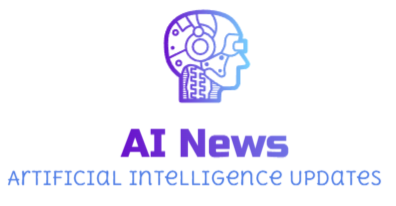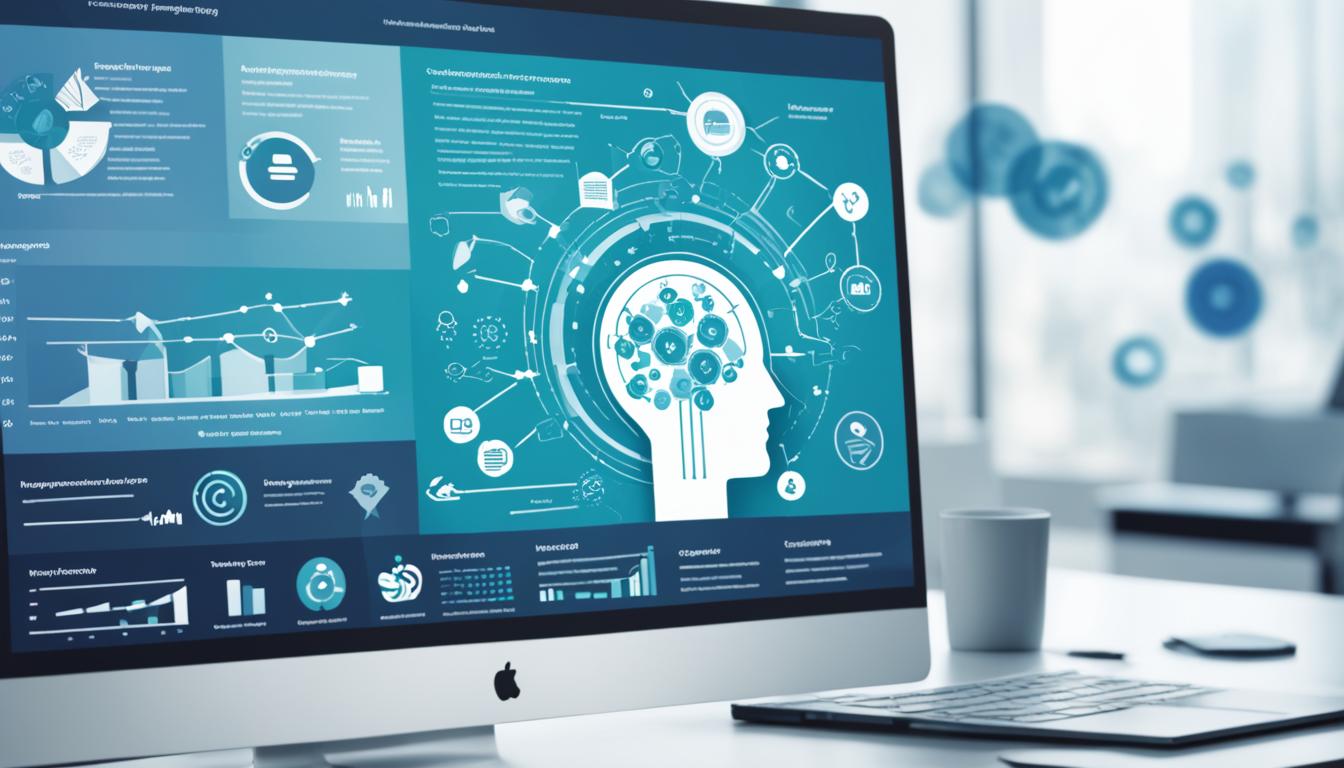The marketing world is changing fast, thanks to big leaps in artificial intelligence (AI) technology. AI is changing how businesses talk to customers, making marketing more precise and big in scale. This article looks at how AI is changing marketing today, with the latest trends, best ways to do things, and real-life examples of AI’s power in marketing.
Key Takeaways
- AI is transforming the marketing landscape, enabling personalization and automation at scale.
- AI-powered solutions are enhancing customer engagement, targeting, and personalization.
- Machine learning algorithms are driving more effective marketing strategies and campaign optimization.
- Automated marketing processes are boosting efficiency and streamlining operations.
- AI-generated content is becoming a powerful tool for creating engaging and relevant marketing materials.
The Rise of AI in Marketing
The marketing world has changed a lot thanks to AI and ML. These new tools are changing how businesses talk to their customers. They make it possible to target and personalize marketing in ways we’ve never seen before.
AI’s Impact on Customer Engagement
AI is changing how we connect with customers. It helps marketers understand what their customers want and need. By looking at lots of data, AI finds patterns and predicts what customers might do next. This leads to marketing that really speaks to people, building stronger bonds between brands and customers.
Leveraging Machine Learning for Better Targeting
Machine learning in marketing has made targeting much better. ML finds the best groups of people to reach, places ads just right, and changes campaigns as needed. This means more people buy what’s being sold and marketing efforts are used wisely. As AI in marketing gets even better, companies are ready to use these tools to stay ahead and grow.
AI in Marketing
AI is changing the game in marketing, making it faster and more precise. It helps businesses understand their customers better. By using AI, marketers can analyze data, improve campaigns, and make messages more personal. This leads to better marketing results.
AI in marketing changes how brands talk to their audience. It uses lots of data to spot trends and give customers what they want. This makes customers more engaged and helps marketers make smart choices.
More and more companies are using AI to get ahead. They use AI for everything from predicting trends to making content. This makes marketing better and lets marketers focus on what matters most: giving great customer experiences.
Personalization Through AI
In today’s digital world, customers want more from brands. They look for experiences that match their own likes and needs. Thanks to AI and machine learning, brands can now offer these personalized experiences on a big scale.
Understanding Customer Behavior
AI can look through lots of customer data, like what they’ve looked at online and what they’ve bought. It helps marketers get to know what each customer likes and does. This deep knowledge lets marketers make experiences that really speak to each person.
Delivering Tailored Experiences
Thanks to AI, marketers can send content and offers that match exactly what each customer wants. This means everything from product tips to emails can be made just for them. This kind of personal touch makes customers more engaged and loyal, which is good for the brand.
As AI and machine learning get better, making experiences even more personal becomes easier. Using these technologies, marketers can create marketing that focuses on the customer in ways old methods can’t.
Automating Marketing Processes
In the digital marketing world, time is crucial. Marketers often get stuck in repetitive tasks, leaving little time for strategy and creativity. But, *marketing automation* and *AI in marketing* are changing this, helping businesses work smarter and more efficiently.
AI-powered marketing automation tools are changing how marketers run their campaigns. These smart systems can handle lead generation, campaign management, and track performance. This frees up time and resources. By using machine learning, marketers can analyze lots of customer data, spot patterns, and give personalized experiences to many people.
Automated lead generation finds and helps potential customers with personalized messages and smart lead scores. This makes the customer experience better and boosts the chance of making a sale. AI also helps manage campaigns by picking the best ad spots, adjusting bids, and tracking results in real-time. This lets marketers make choices based on data and improve their strategies.
The mix of *AI in marketing* and automation is changing how businesses do marketing. By automating routine tasks and using data, marketers can focus on making big impacts, creating engaging content, and building strong customer relationships.
AI-Powered Content Creation
Modern marketing has seen a big change thanks to AI technology. Now, marketers can make engaging, personalized, and effective content easily. This is all thanks to machine learning.
Generating Engaging Copy
AI is changing how we make content. It uses natural language processing and machine learning to understand what people like. This helps create content that really speaks to the audience.
From social media posts to product descriptions, AI has made content creation faster and more effective. It’s a big change in marketing.
Using AI in marketing helps businesses make content faster and more engaging. It also gives customers a more personal experience. As AI grows in marketing, those who use it will see more efficiency, creativity, and better content results.
AI and Predictive Analytics
In the fast-changing world of marketing, AI and predictive analytics are changing the game. They help brands understand the future better. By using AI, marketers can look at past data and trends to guess what customers will do next. They can also spot new chances to grow.
Forecasting Trends and Opportunities
AI can go through huge amounts of data to find patterns and give marketers valuable insights. This lets businesses know what customers like, predict changes in the market, and adjust their plans early. It’s like having a crystal ball for marketing.
With *machine learning in marketing*, AI gets better over time. Marketers can then make their strategies sharper and use new trends to their advantage. This way, brands can stay ahead and meet their customers’ changing needs.
As *AI in marketing* gets better, the possibilities for predictive analytics grow. It can help predict sales, improve campaigns, find new products, and adjust prices. Brands that use this tech can move faster and more accurately into the future. They can give their customers better, more tailored experiences.
Integrating AI into Your Marketing Stack
As marketing changes, businesses need to find new ways to use AI to succeed. Adding AI tools to your marketing can bring more personalization, automation, and smart decisions.
AI-Driven Martech Solutions
From AI in marketing to marketing automation, today’s AI technologies are changing the game. Tools like chatbots, predictive analytics, and content generation make marketing easier, improve customer interaction, and give deep insights into your audience.
By adding these AI tools to your marketing, you create a smooth and effective system. This system makes your marketing better, boosts campaign results, and leads to better business outcomes.
First, find where AI can help your marketing the most. Then, look for martech solutions that fit those needs. Whether it’s making content for each customer, predicting customer groups, or automating lead follow-up, AI opens up many possibilities in your marketing.
Ethical Considerations in AI Marketing
AI and machine learning are changing marketing fast. It’s important to think about the ethical sides of these technologies. Marketers need to make sure their AI use is clear, fair, and respects people’s privacy and data rights. This is key to keeping trust and building loyalty over time.
Being open is a basic rule in AI marketing. People have the right to know how their data is handled and how AI makes decisions. Marketers should be clear about how they collect, process, and use data. This helps customers make better choices about their brand interactions.
AI can also have biases if the data it learns from is not diverse. Marketers must watch their AI to prevent it from unfairly targeting certain groups or spreading harmful stereotypes. By being inclusive, brands can connect better with their audience.
Using AI responsibly in marketing is both a moral and strategic need. People care more about their privacy and prefer brands that act ethically. By focusing on being open, fair, and protecting data, marketers can use AI to offer personalized experiences. This can lead to more loyalty and growth for the brand.
Case Studies: Brands Leveraging AI
In modern marketing, AI in marketing has changed how businesses talk to their customers. Top brands see the big benefits of this new tech and use it in their marketing plans. Let’s look at some great examples that show how AI personalization and marketing automation make a big difference.
Stitch Fix is a great example. This styling service uses AI in marketing to give customers clothes they’ll love. It keeps 85% of its customers coming back. The AI looks at what customers like, their sizes, and what they’ve bought before. This makes sure each box of clothes is just right for them.
Spotify is another big name using AI well. Its AI personalization helps make playlists just for you. This makes people listen more and stay loyal. Spotify’s AI knows what you like to hear, so you spend 2.5 hours a day listening to music on it.
These stories show how AI in marketing can really change things for the better. It makes customers happier, keeps them coming back, and helps businesses do well. As more brands use marketing automation, we’ll see even more cool ways AI changes marketing.
The Future of AI in Marketing
AI in marketing is growing fast, leading to exciting changes ahead. We’ll see big steps in natural language processing, computer vision, and reinforcement learning. These advancements promise to change the game in AI-powered marketing.
Emerging AI Technologies
Natural language processing (NLP) is a key area of innovation in marketing AI. As NLP gets better, AI will help marketers understand and answer customer questions. It will also make writing emails and other tasks easier.
Machine learning in marketing is also getting better. It will help marketers predict customer behavior, personalize experiences, and improve campaigns on a large scale.
Computer vision AI is another big area to watch. It will let brands analyze images and videos to understand what customers like and feel. This will lead to more engaging ads and marketing visuals.
Reinforcement learning is another exciting development. It lets AI systems learn by trying different things and seeing what works. This will help marketers make their strategies better over time. It means marketing will get more tailored to what each customer wants.
Conclusion
AI has changed how businesses talk to their customers. It brings personalized experiences and makes marketing smoother. With AI, marketers can now give customers what they want, predict trends, and make their strategies better.
But, using AI in marketing also brings up big ethical questions. Marketers need to use AI in a way that respects privacy and builds trust. As AI gets better, companies must keep up with new rules and check how their AI tools affect people.
The future of AI in marketing looks bright. New tech like natural language processing and computer vision will make AI marketing even better. Marketers using these new tools will be able to make their campaigns more personal, engaging, and effective. This will help businesses grow, keep customers happy, and succeed in the long run.





